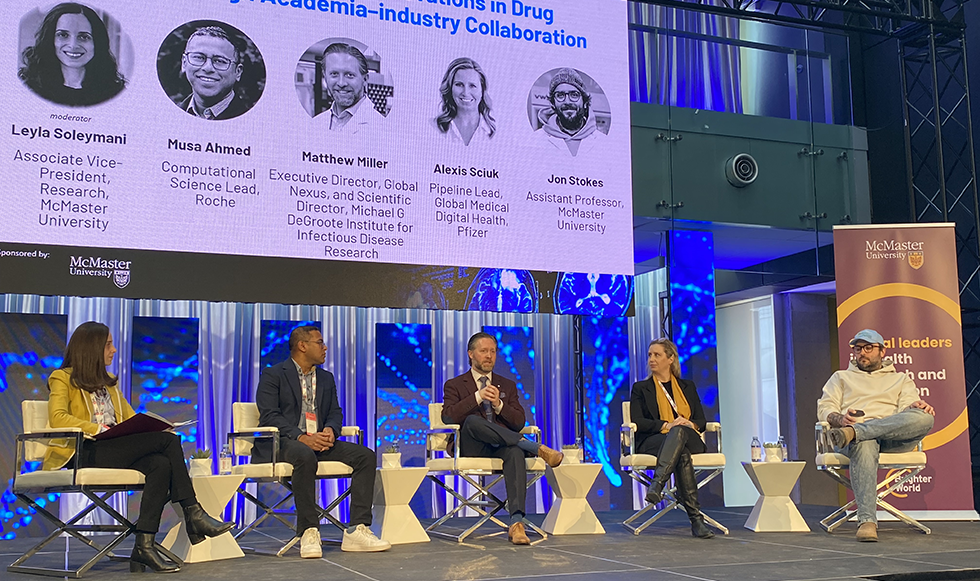An ‘epic’ opportunity to accelerate global drug discovery

The panelists from left to right: Leyla Soleymani, McMaster University; Musa Ahmed, Roche; Matthew Miller, McMaster University; Alexis Sciuk, Pfizer; and Jon Stokes, McMaster University.
BY Lisa Polewski
April 16, 2025
Universities play a key role in bringing together policy makers and industry to get life-saving drug discoveries from the lab to patients, McMaster researchers and industry experts told a global audience this month.
Leyla Soleymani, McMaster’s associate vice-president of research (Commercialization & Entrepreneurship) and co-founder of FendX Technologies, moderated a discussion at the Times Higher Education Digital Health 2025 Summit that explored how academia can drive breakthroughs in AI and transform lab innovations into market-ready solutions.
Academic institutions are well poised to mitigate one of the biggest obstacles in drug discovery, which is getting regulatory approval for new drugs, said panelist Matthew Miller, associate professor and executive director of McMaster’s Global Nexus.
“We don’t live in a vacuum, and to bring something from the ideation or discovery stage in academia to something that can really help people requires partners that span sectors,” said Miller, co-founder of Aeroimmune Inc., a McMaster startup developing a next-generation, inhaled COVID-19 vaccine.
The current geopolitical situation gives Canada “the most epic opportunity” to unite its research hubs with stakeholders in a way that’s never been done before to elevate the country’s position on the global stage, said Alexis Sciuk, pipeline lead of global medical digital health at Pfizer.
She said she would love to see academia become more of a “champion and advocate” for drug development.
“This is the space in Canada that’s missing for me, that academic leadership making sure everyone comes to the table,” said Sciuk.
The collaboration in the scientific community on vaccines during the COVID-19 pandemic is a great example of stakeholders working together for successful drug development, said panelist Musa Ahmed, computational science lead at Roche.
With AI already speeding up the process of drug making, Ahmad predicted that getting a drug from the lab to patients will go from the current 12 to 15 years to about eight years.
A major obstacle in training AI models is the lack of data to inform the end product — data that could be supplied by parties that aren’t currently involved in the development process, said panelist Jon Stokes, an assistant professor and member of McMaster’s Michael G. DeGroote Institute for Infectious Disease Research (IIDR).
“I think these true next-generation breakthroughs are going to be when we figure out, as a collective drug discovery and scientific community, how to get all of these different pieces, these machine learning pieces and laboratory hardware to speak together fluently, such that the iterative drug optimization process becomes super streamlined, super-fast and ideally super inexpensive,” said Stokes, whose startup, Stoked Bio, uses AI to develop new antibiotics and drugs.
With AI changing the game – and the players – it’s crucial to start speaking the same language, Scuik agreed.
“Where I used to spend the vast majority of my days with doctors and nurses and pharmacists, I now spend it with software architects, engineers and coders, and I will tell you it is a completely different language that we all speak,” Sciuk said. “But it’s one that we need to start understanding.”
Universities were not originally envisioned to have a major role in the commercialization of scientific discoveries, but that’s something that needs to change, Miller said.
“Leveraging our strength in discovery and innovation and creativity while bringing in the external competencies that add that really important practical design-guided approach is how Canada is especially well poised to continue to show leadership in this space.”


